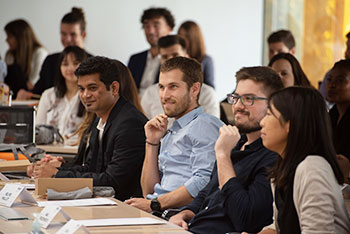Recognition to EADA’s MBA for its sustainability approach
 EADA’s International MBA improves international recognition for its sustainability approach. Today, Corporate Knights has published its annual Better World Ranking MBA, in which this master’s programme has been ranked among the 20 best International MBAs in the world due to its integration of sustainable development, faculty research on sustainability issues as well as gender and racial diversity of its faculty. Compared to the 2021 ranking, EADA Business School has moved up 15 places, from 34 to 19.
EADA’s International MBA improves international recognition for its sustainability approach. Today, Corporate Knights has published its annual Better World Ranking MBA, in which this master’s programme has been ranked among the 20 best International MBAs in the world due to its integration of sustainable development, faculty research on sustainability issues as well as gender and racial diversity of its faculty. Compared to the 2021 ranking, EADA Business School has moved up 15 places, from 34 to 19.
To produce this ranking, Corporate Knights evaluated 160 business schools, including the Top 100 global MBA programmes from the Financial Times 2022 ranking, the Top 40 schools in the Corporate Knights’ Better World MBA Ranking 2021 and the MBA programmes accredited by AMBA, AACSB or EQUIS and/or those signatores to the Principles For Responsible Management Education who opted for evaluation.
This ranking is based on 7 key performance indicators: course integration of sustainability (30%), research publications per faculty member on sustainability topics (20%), percentage of total faculty publications on sustainability topics (20%), number of citations per faculty for those publications (10%), sustainability-focused research institutes and centres (10%), faculty gender diversity (5%) and faculty racial diversity (5%).
Founded in 2002 and based in Toronto, Corporate Knights is a research institution which focuses on clean capitalism; an economic system which takes into account economic and ecological factors. It is best known for producing transparent rankings in the field of corporate sustainability.
Focus on sustainability
One of the specializations (Path of Development) that participants can choose in the third term of the International MBA is ‘Sustainability & Business Impact’. The main objective is that they acquire the skills and knowledge to lead the sustainable transition of any company, to make strategic decisions based on the positive impact on society and also to promote change in their community (multiplier effect).
In this specialisation, which incorporates the United Nations SDGs, sustainability experts with different backgrounds talk to participants about current issues such as the circular economy, impact measurement, sustainable finance or new consumption habits related to sustainability. In addition, a recognized company offers them a real corporate challenge regarding sustainability.
At the end of the programme, participants are able to identify the sustainability challenges, understand the new principles that guide the emerging new sustainable business paradigm, become professionals with a purpose and lead and manage the sustainable transformation in impact-focused organisations.
